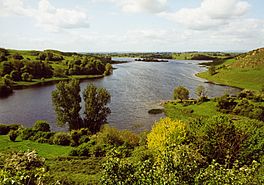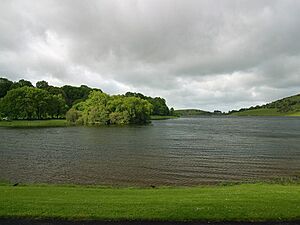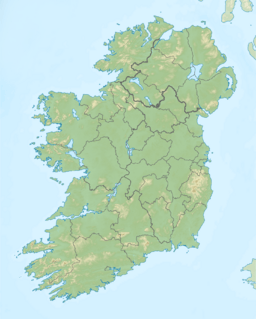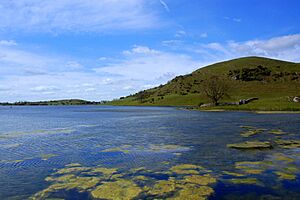Lough Gur facts for kids
Quick facts for kids Lough Gur |
|
|---|---|
 |
|
| Location | County Limerick |
| Coordinates | 52°30′58.97″N 8°31′59.80″W / 52.5163806°N 8.5332778°W |
| Native name | Loch Goir (Irish) |
| Basin countries | Ireland |
| Surface area | 0.78 km2 (0.30 sq mi) |
| Average depth | 1.5 m (4 ft 11 in) |
| Max. depth | 3.8 m (12 ft) |
| Water volume | 1.2 hm3 (970 acre⋅ft) |
| Residence time | 0.21 years |
Lough Gur (pronounced 'Lock Goor') is a beautiful lake in County Limerick, Ireland. It is located between the towns of Herbertstown and Bruff. The lake looks like a horseshoe at the bottom of Knockadoon Hill. It is surrounded by hills and countryside.
Lough Gur is one of Ireland's most important places for archaeology. Archaeology is the study of human history through digging up old things. People have lived near Lough Gur for a very long time, since about 3000 BC. This means they were here over 5,000 years ago! You can find many ancient stone structures, called megaliths, around the lake.
Contents
A Place of Ancient History
Lough Gur is like a giant outdoor museum. You can find many amazing ancient sites here.
Stone Circles and Tombs
The Grange stone circle is located near the lake. It is the largest stone circle in all of Ireland. Imagine a huge ring made of standing stones! There is also a dolmen nearby. A dolmen is an ancient tomb made of large flat stones.
Old Homes and Forts
Archaeologists have found the remains of at least three crannogs in the lake. Crannogs were ancient homes built on artificial islands in lakes. They also found outlines of Stone Age houses on land. These outlines are sometimes called "The Spectacles" because of their shape. Many ring forts are found in the area. These were circular earthworks used for protection. One large hill fort even overlooks the lake. Some of these ancient sites are protected as Irish national monuments.
Legends and Stories
Lough Gur is also famous for its exciting legends. One popular story is about Gearóid Iarla. He was a powerful lord and poet in the 14th century. People say he sleeps in a cave near the lake. The legend says he will wake up and ride his great white horse, which has silver shoes, around the lake when Ireland needs him most.
Fun Things to Do
Lough Gur is a great place to visit today. There is a special visitors' centre right by the lake. You can also find a car park and a picnic area. The shoreline near the visitor area is gentle and shallow. This makes it a perfect spot for water sports. However, motorboats are not allowed on the lake to keep it peaceful.
Castles and Old Buildings
You can explore several old buildings around Lough Gur.
Bourchier's Castle
Near the car park entrance, you will see a castle. It is a tower house called Bourchier's Castle. It was named after Sir George Bourchier. This castle is located on a narrow piece of land that sticks out into the lake. It is not open to visitors, but you can still admire it from outside.
Ancient Churches and Norman Castles
You can also find the ruins of an early Christian church along the road leading to the lake. At the far end of the lake are the ruins of a Norman castle. This castle is called Black Castle. You can reach it by taking a walk along the hillside on the east side of the lake. Black Castle was used during the Desmond Rebellions. It is believed to be where the Earl of Desmond showed his power in 1573. He returned from London, took off his English clothes, and put on Irish ones.
Amazing Discoveries
Lough Gur is a very important place for finding Irish Elk skeletons. These were huge deer that lived a long time ago. The National Museum of Ireland – Natural History has some Irish Elk skeletons from Lough Gur. You can also see specimens from Lough Gur at Leeds Museums and Galleries in the UK.

See also
 | Selma Burke |
 | Pauline Powell Burns |
 | Frederick J. Brown |
 | Robert Blackburn |



